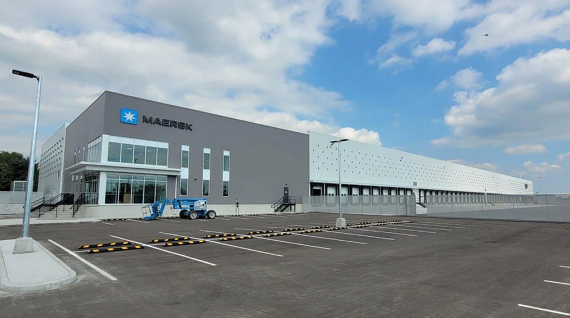-
The Pacific Transload Express facility has been opened with Canadian Pacific Railway
-
Fast-moving consumer goods will comprise 80% to 90% of volumes
-
The cargo transit time variation can be reduced from 35 to 75 days door-to-door to consistently at 35 to 40 days
-
The new facility will eliminate over 100,000 truck trips per year in the Vancouver area and save over 4,000 tons of carbon dioxide emissions per year
Maersk Canada and Canadian Pacific Railway (CP) have opened a transloading facility in Vancouver, Canada to make Asia-Pacific Northwest (PNW) supply chains more resilient, flexible and cost-effective by moving goods by rail, eliminating over 100,000 truck trips a year.
The new 117,000-square-foot, 103-door Pacific Transload Express facility was established to transload international containers into domestic 53-foot trailers to enable customers to achieve overall cost savings for domestic distribution, while reducing storage costs related to port demurrage and inland detention, Maersk said in a release.
Transloading is a shipping term that refers to the transfer of goods from one mode of transportation to another en route to their ultimate destination.
Supply chains flowing through the facility will be fast-moving consumer goods (FMCG) in the retail and lifestyle segment that need an agile response to consumer demand fluctuations. FMCG will comprise 80% to 90% of the volumes and auto parts 10% to 20%.
Construction of the new Asia-PNW gateway chapter and rail infrastructure was completed last month, with Maersk starting the transloading operation of the facility on September 1. The first containers arrived at the facility on the second week of this month.
Maersk said this first-of-its-kind transload facility is transforming inbound logistics in North America by reducing transit time variability, while at the same time leaving a smaller environmental impact and carbon footprint by taking thousands of trucks off the road and leveraging the benefits of moving goods by rail.
CP will shuttle containers by rail from the three major Vancouver container terminals to the Pacific Transload Express facility. It built the facility on its land adjacent to its Vancouver Intermodal Facility to offer optimal transload services with fewer handoffs and better accountability of service.
Currently, transit times range from 35 to 75 days from Asia to North America from factory at origin to a distribution center at destination, making it difficult for companies to plan supply chain management well.
“As a result, most companies buy products in advance and build higher safety stock to mitigate the transit time fluctuation, positioning storage solutions closer to their customers,” said Maersk.
The transload solution can help customers reduce the transit time variation from 35 to 75 days door-to-door to having the cargo in consistently at 35 to 40 days, helping them reduce safety stock and save money on inventory storage costs, it added.
The facility specifically integrates and extends the use of CP rail service direct from the port of Vancouver as a lower carbon emission choice than multiple trucks in the port complex and on local roads.
The new facility will eliminate over 100,000 truck trips per year in the Vancouver area (almost 60,000 round trips per year), and save over 4,000 tons of carbon dioxide (greenhouse gas) emissions a year, which is equivalent to the CO2 emissions of 9,261 barrels of oil consumed.
The reductions have two sources, Maersk said. One is the shorter direct rail connection between Centerm, Vanterm and Deltaport and the transload facility vs. a triangle route by truck, reducing the miles the cargo is moved. The other is the energy efficiency of rail, which is three to four times more energy efficient than trucking.






I always prefer to read the quality content and this thing I found in your post. I am really thank ful for you for this post.
Comments are closed.